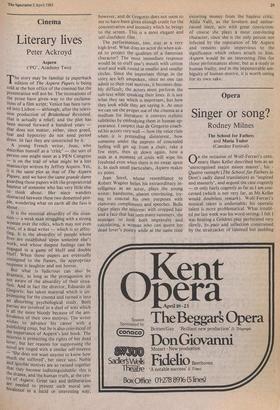Cinema
Literary lives
Peter Ackroyd
Aspern (PG', Academy Two)
The story may be familiar (a paperback edition of The Aspern Papers is being sold at the box office of the cinema) but the presentation will not be. The intimations of the prose have given way to the exclama- tions of a film script; Venice has been turn- ed into Lisbon — although, after the televi- sion production of Brideshead Revisited, that is actually a relief; and the plot has been moved forward a hundred years — that does not matter, either, since greed, fear and hypocrisy do not need period dress. In fact they are constricted by it.
A young French writer, Jean, who describes himself as a 'critic' — the sort of person one might meet at a PEN Congress — is on the trail of what might be a lost Manuscript written by Jeffrey Aspern. Yes, it is the same plot as that of The Aspern Papers, and we have the same grande dame guarding those papers with the proprietorial hauteur of someone who has very little else to think about. Her niece wanders distracted between these two demented peo- ple, wondering what on earth all the fuss is about.
It is the essential absurdity of the situa- tion — a weak man struggling with a strong woman over the relics, which may not even exist, of a dead writer — which is so affec- ting. It is the absurdity of people whose lives are established upon someone else's work, and whose deepest feelings can be engaged in a game of bluff and double bluff. When those papers are eventually consigned to the flames, the appropriate response is laughter and not horror. But what is ludicrous can also be dramatic, as long as the protagonists are not aware of the absurdity of their situa- tion. And in fact the director, Eduardo de Gregorio, has taken material which is un- Promising for the cinema and turned it into an absorbing psychological study. Both parties are involved in a duel of wits which IS all the more bloody because of the am- bivalence of their own motives. The writer wishes to advance his career with a Publishing coup, but he is also convinced of the importance of Aspern's lost book. The mistress is prOtecting the rights of her dead lover, but her reasons for suppressing the novel are tinged with a similar self-interest — She does not want anyone to know how
much she suffered', her niece says. Noble and ignoble motives are so twined together that they become indistinguishable: this is the drama, and the human truth, at the cen- tre of Aspern. Great tact and deliberation are needed to present such moral am- bivalence in a lucid or interesting way,
however, and de Gregorio does not seem to me to have been given enough credit for the concentration and intensity which he brings to the screen. This is a most elegant and self-Confident film.
The performances, too, stay at a very high level. What does an actor do when ask- ed to project the qualities of a Jamesian character? The most immediate response would be to stuff one's mouth with cotton wool and walk round in smaller and smaller circles. Since the important things in the story are left unspoken, since no one can admit to their real motives, it becomes dou- bly difficult; the actors must perform the sub-text while speaking their lines. It is not what they say which is important, but how they look while they are saying it. At once we can see the proper use of the cinema as a medium for literature: it conveys stylistic subtleties by embodying them in human ap- pearance. I suspect that de Gregorio coach- ed his actors very well — how the voice rises when it is pretending disinterest, how someone under the impress of concealed feeling will get up from a chair, take a few steps, then sit down again, how a man at a moment of crisis will wipe his forehead even when there is no sweat upon it. In such small particulars, Aspern makes its point.
Jean Sorel, whose resemblance to Robert Wagner belies his extraordinary in- telligence as an actor, plays the young writer: handsome, almost convincing, try- ing to conceal his own purposes with elaborate compliments and speeches. Bulle Ogler plays the mistress: with cropped hair and a face that has seen many summers, she manages to look both impressive and calculating, a woman who can quote her dead lover's poetry while at the same time
extorting money from the hapless critic. Alida Valli, as the lovelorn and embar- rassed niece, acts with great conviction: of course she plays a most convincing character, since she is the only person not infected by the reputation of Mr Aspern and remains quite impervious to the significance which others attach to him. Aspern Would be an interesting film for those performances alone; but as a study in human frailty, and in the impenetrable am- biguity of human motive, it is worth seeing for its own sake.






































 Previous page
Previous page